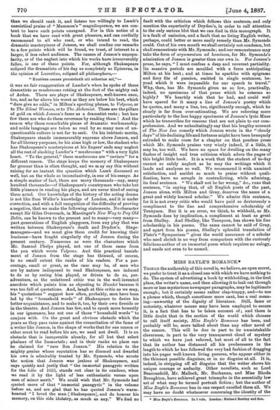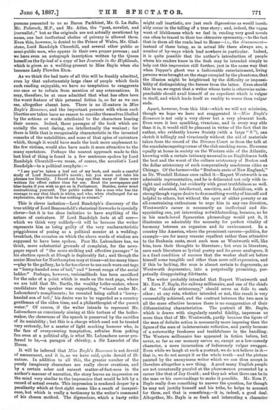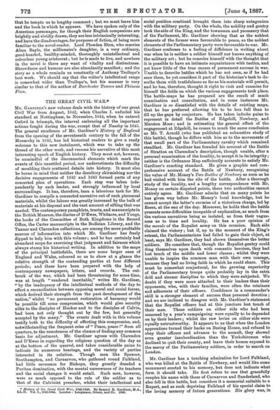MISS BAYLE'S ROMANCE.* Taman the authorship of this novel is,
we believe, an open secret, we prefer to treat it as a closed one with which we have nothing to do. The system of advertising a book by withholding, in the first place, the writer's name, and then allowing it to leak out through more or less mysterious newspaper paragraphs, may be legitimate enough; but it certainly seems rather clap.trappy, and—to use a phrase which, though sometimes mere cant, has a real mean- ing—unworthy of the dignity of literature. Still, fame or notoriety, whatever means may have been employed to secure it, is a fact that has to be taken account of ; and there is little doubt that in the section of the world which chooses to call itself society, Miss Bayle's Romance has been, and probably will be, more talked about than any other novel of the season, This will be due in part to its unmistakable cleverness, in part to the very transparent cloud of mystery to which we have just referred, but most of all to the fact that its author has distanced all his predecessors in the length to which he has followed the very bad fashion of dragging into his pages well-known living persons, who appear either in the thinnest possible disguises, or in no disguise at all. It is, indeed, in stripping off all disguise that the writer shows his unique courage or audacity. Other novelists, such as Lord Beaconsfield, Mr. Mallock, Mr. Buchanan, and Miss Rhoda Broughton, have achieved great triumphs in the essentially low art of what may be termed portrait fiction; but the author of Miss Bayle's Romance has in one respect excelled them all. We may have no doubt whatsoever concerning the identity of the
• Min Bayles Romance. In 8 vols. London Biased Bentley and Bon.
persons presented to us as Baron Parkhirst, Mr. G. La Salle, Mr. Pa'artier, M.P., and Mr. Atlas, the "poet, novelist, and journalist;" but as the originals are not actually mentioned by name, one last ineffectual shelter of privacy is allowed them. Even this, however, is denied to the Prince of Wales, Mr. Glad- stone, Lord Randolph Churchill, and several other public or semi-public men, who appear in their own proper persons ; and we have even an autograph inscription written by the Queen herself on the fly-leaf of a copy of her Journals in the Highlands, which is given as a wedding-present to Miss Bayle when she becomes Lady Plowden Eton.
As we think the bad taste of all this will be frankly admitted, even by that unfortunately large class of people which finds such reading enjoyable, we have no temptation to exaggerate our case or to refrain from mention of any extenuations. It may, therefore, be at once admitted that what has often been the worst feature of this personal fiction is, so far as we can see, altogether absent here. There is no ill-nature in Miss Bayle's Romance, and the important persons with whom such liberties are taken have no reason to consider themselves libelled by the actions or words attributed to the characters bearing their names. Indeed, those passages of the book which are socially the most daring, are intellectually the weakest ; for there is little that is recognisably characteristic in the invented remarks of the notabilities, and none of that spice of caricature which, though it would have made the book more unpleasant to the few victims, would also have made it more attractive to the many spectators. Perhaps the nearest approach made to this last kind of thing is found in a few sentences spoken by Lord Randolph Churchill—we mean, of course, the novelist's Lord Randolph—to a political neophyte :— " I see you've taken a leaf out of my book, and made a careful study of Lord Beaconsfield's novels; but you mast not take his phrases too literally. I found out long ago that many of them were written for effect rather than for use. Read the newspapers and blue-books if you wish to get on in Parliament. Besides, never mind contradicting yourself. The public rather like a man who has the courage to say that black is white, and who, when challenged for an explanation, says that he has nothing to retract."
This is clever imitation—Lord Randolph's discovery of the true utility of Lord Beaconsfield's rhetorical fireworks is specially clever—but it is too close imitation to have anything of the nature of caricature. If Lord Randolph feels at all sore— which we think very unlikely—it will be because the writer represents him as being guilty of the very uncharacteristic priggishness of posing as a political mentor at a wedding- breakfast, the occasion on which the above words of wisdom are supposed to have been spoken. Poor Mr. Labonchere has, we think, more substantial grounds of complaint, for the news- paper report of " the more striking and effective passages " in his election speech at Slough is deplorably flat ; and though the senior Member for Northampton may at times—at too many times —play to the gallery, he is far too clever to use such worn-out tags as "horny-handed sons of toil," and "lowest rungs of the social ladder." Perhaps, however, verisimilitude has been sacrificed for the sake of a point which is made on the next page, where we are told that Mr. Bartle, the wealthy boiler-maker, whose candidature the speaker was supporting, "winced under Mr. Labouchere's compliments ; he resented being called a ' horny- handed son of toil ;' his desire was to be regarded as a country gentleman of the olden time, and a philanthropist of the purest water." Of course, if the writer intends to represent Mr. Labonchere as consciously aiming at this torture of the boiler. maker, the cleverness of the speech is preserved by the sacrifice of its amiability ; but this is a charge which need not be treated very seriously, for a master of light mocking humour who, in the face of overpowering temptation, refrains from poking fun even at a political ally, is what Mr. Labonchere never pro- fessed to be,—a paragon of chivalry, a Sir Lancelot of the House.
It will be inferred that Miss Bayle's Romance is not devoid of amusement, and it is, as we have said, puts devoid of ill- nature. In addition to all this, the greater number of the purely imaginary characters are really clever creations, and by a certain sober and earnest matter-of-fact-ness in the author's manner of narration, the story leaves an impression on the mind very similar to the impression that wonld be left by a record of actual events. This impression is rendered deeper by a peculiarity which at first eight seems like a result of inexperi- ence, but which is really a testimony to the writer's command of his chosen method. The digressions, which a hasty critic
might call inartistic, are just such digressions as would inevit- ably occur in the telling of a true story ; and, indeed, the vague want of lifelikeness which we feel in reading very good novels can often be traced to their too obtrusive symmetry,—to the fact that in them all the roads lead to Rome—ie., the denouement— instead of there being, as in actual life there always are, a. number of by-ways which lead nowhere in particular. Indeed, it is quite possible that the author's introduction of people whom his readers know in the flesh may be intended simply to help out this impression still further, just in the same way that when Pepper's ghost was a fashionable entertainment, living persons were brought on the stage occupied by the phantoms, that the illusion might be heightened by the difficulty or impossi- bility of distinguishing the former from the latter. Even should this be so, we regret that a writer whose taste is otherwise unim- peachable should avail himself of an expedient which is vulgar in itself, and which lends itself so readily to worse than vulgar ends.
Apart, however, from this blot—which we will not minimise, though we hope we have not exaggerated it—Miss Bugle's Romance is not only a very clever but a very pleasant book. Even were it less sparkling, vivacious, and in every way able than it is, it would still be pleasant in virtue of the fact that its author, who evidently knows Society (with a large " S "), can sketch it tellingly and vivaciously without the aid of materials taken from the record of the Divorce Court or from the talk at the scandalmongeringcorner of the club smokingroom. He seems equally at home in society on the Western side of the Atlantic, knowing with a certain intimacy unusual in an Englishman both the best and the worst of the culture aristocracy of Boston and the dollar aristocracy of such comparatively mushroom cities as Chicago. Of the former—the "Brahmin caste of New England," as Dr. Wendell Holmes once called it—Rupert Wentworth is an admirable representative, and he is delineated not only with in- sight and subtlety, but evidently with great truthfulness as well. Highly educated, intellectual, sensitive, and fastidious, with a strong though vague desire to do something worthy of himself and helpful to others, but without the spur of either poverty or an all-constraining enthusiasm to urge him in any one direction, Wentworth's career is necessarily an ineffectual and dis- appointing one, yet interesting notwithstanding, because, as he in his much-loved Spencerian phraseology would put it, it illustrates so admirably the necessity for perfect vitality of harmony between an organism and its environment. In a country like America, where the prominent careers—politics, for example—are for many reasons repellent rather than attractive to the Brahmin caste, most such men as Wentworth will, like him, turn their thoughts to literature ; but even in literature, save such literature as lyrical poetry and its prose analogues, it is a fixed condition of success that the worker shall set before himself some tangible end other than mere self-expression, and if this be lacking, the man is almost certain to degenerate, as Wentworth degenerates, into a perpetually promising, per- petually disappointing dilettante.
The writer probably intended that Rupert Wentworth and Mr. Ezra P. Boyle, the railway millionaire, and one of the chiefs of the "shoddy aristocracy," should serve as foils to each other ; at any rate, whether intended or not, this result is very successfully achieved, and the contrast between the two men is all the more effective because there is no exaggeration of their differentiating characteristics. The portrait of Mr. Bayle. which is drawn with singularly careful fidelity, impresses us more than that of Mr. Wentworth, partly because the figure of the man of definite action is necessarily more imposing than the figure of the man of indeterminate reflection, and partly because of a noteworthy freshness and truthfulness in the handling. The Western millionaire has appeared in fiction before, but never, so far as our memory serves us, except es a low-comedy character, a mere incarnation of ludicrously vulgar swagger. Even while we laugh at such a portrait, we do not believe in it— that is, we do not accept it as the whole truth—and the picture painted by the anonymous writer which we can thus accept is therefore altogether a new thing. A good many English people are not unnaturally puzzled at the phenomenon presented by a career like that of Jay Gould ; and they ask what there can be in the man or his surroundings to make it possible. Mr. Ezra P. Bayle really does something to answer the question, for though he may not justifiy himself and his tribe, he helps to account for them, and that is something,—it is, indeed, a good deal. Altogether, Mr. Bayle is so fresh and interesting a character
that he tempts us to lengthy comment ; but we must leave him and the book in which he appears. We have spoken only of the American personages, for though their English companions are brightly and vividly drawn, they are less intrinsically interesting, and have the disadvantages, for purposes of fiction, of being more familiar to the novel-reader. Lord Plowden Eton, who marries Alma Bayle, the millionaire's daughter, is a very ordinary, good-hearted, healthy-minded, thoroughly unintellectnal and colourless young aristocrat ; but he is made to live, and nowhere in the novel is there any want of vitality and distinctness. Shrewdness and humour are also abundantly manifest ; and the story as a whole reminds ns constantly of Anthony Trollope's best work. We should say that the writer's intellectual range is somewhat wider than Trollope's, but his manner is very similar to that of the author of Barchester Towers and Phineas Finn.




































 Previous page
Previous page